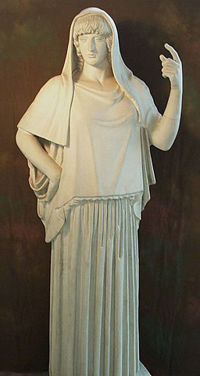
Hestia (Ἑστία), the Olympian goddess of the hearth, home, architecture, domesticity, family, and the state, holds a unique and often overlooked position in the Greek pantheon. Unlike her more prominent siblings, she was not associated with grand battles or dramatic love affairs. Instead, she embodied the quiet strength and stability of the home, the very foundation of Greek society.
A Goddess of Peace and Domestic Harmony
Hestia, the eldest daughter of Cronus and Rhea, was known for her gentle nature and unwavering devotion to her duties. She chose to forgo the drama of romantic entanglements and instead dedicated herself to maintaining the sacred flame of the hearth, a symbol of family unity and communal well-being.
Key Attributes and Symbols
- Goddess of the Hearth: Hestia's primary role was to tend the sacred flame, both in private homes and public temples.
- Symbol of Domesticity and Family: She represented the warmth, comfort, and security of the home.
- Guardian of the State: In public life, the hearth represented the stability and continuity of the city-state.
- Virgin Goddess: Hestia swore an oath of perpetual virginity, symbolizing her dedication to her sacred duties.
- Symbols: Her symbols include the hearth flame, the kettle, the pig, and the donkey.
Myths and Legends
Hestia's presence in Greek mythology is subtle but significant. She rarely features in dramatic tales, but her influence is felt in the daily lives of mortals and the stability of the Olympian order.
- Rejection of Poseidon and Apollo: Both Poseidon and Apollo sought Hestia's hand in marriage, but she refused, vowing to remain a virgin and dedicating herself to tending the sacred flame.
- The First and Last: As the eldest child of Cronus, Hestia was the first to be swallowed and the last to be regurgitated, making her both the eldest and youngest.
- Her Place in the Olympian Council: In some accounts, Hestia relinquished her seat on the Olympian council to Dionysus, choosing to focus on her sacred duties. This act highlights her selflessness and dedication.
- Sacred Fire: Every private and public hearth was sacred to Hestia. New colonies would take a flame from the public hearth of their mother city when they left.
Hestia's Enduring Legacy
Hestia represents the importance of home, family, and stability. Her quiet strength and unwavering dedication to her duties make her a powerful symbol of domestic harmony and communal well-being.
Modern Relevance
While the ancient Greek rituals surrounding the hearth have faded, Hestia's symbolism remains relevant in modern society. She reminds us of the importance of creating a warm and welcoming home, fostering strong family bonds, and maintaining a sense of community. She is the embodiment of peace, stability, and the quiet strength found in everyday life. In a world often filled with chaos and uncertainty, Hestia's presence offers a sense of comfort and security. She is a reminder that the simple acts of caring for our homes and loved ones are essential for building a strong and harmonious society.
 Menu
Menu